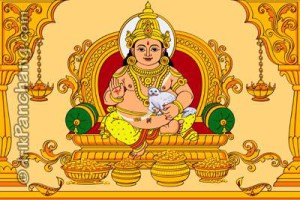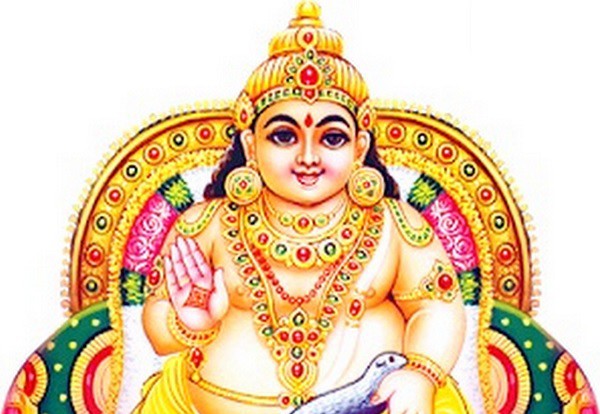No products in the cart.
Kubera is the god of Wealth of the Hindus. He is also the god-king of celestial beings called Yakshas. He is also regarded as the regent of the North, and a protector of the world. He is often shown as a short statured man with a plump body carrying a money pot in one hand and a club in the other hand. He is often shown to wear lots of jewelleries. Kubera’s mount is the elephant, and his consorts are Riddhi or Bhadra/Kauberi/Charvi.
In the scriptures of the Vedic era, Kubera was mentioned as the chief of all evil spirits in the world, and he obtained the status of a god only in the Puranas. The scriptures tell us that Kubera was once the ruler of Lanka, but was overthrown by his evil stepbrother Ravana, who went on to rule over Lanka till he was killed by Lord Rama, as mentioned in the great Indian epic Ramayana.
After being banished from his kingdom by his brother Ravana, Kubera settled in the city of Alaka, which was somewhere deep in the Himalayas. Many scriptures talk about the grandeur and glory of Kubera’s kingdom. Kubera is also a part of Buddhist and Jain mythology. He is known as Vaisravana in the ancient religious Buddhist texts, while in Jainism he is known as Sarvanubhuti.
Kubera is shown to be of short height, with fair complexion and a pot belly. He is described as having only three legs, eight teeth and one eye. He is adorned with jewels of various types. Usually Kubera is shown to be riding an elephant, but at times he is shown to ride man too. Only the later Vedic texts talk about the deformities of Kubera.
 Kubera holds a mace in one hand and either a money pot or pomegranates in the other hand. Sometimes, he also carries a mongoose with him. The mongoose is often thought to be a symbol of Kubera’s victory over Nagas in Tibet. In Buddhism, Kubera is often depicted with a mongoose.
Kubera holds a mace in one hand and either a money pot or pomegranates in the other hand. Sometimes, he also carries a mongoose with him. The mongoose is often thought to be a symbol of Kubera’s victory over Nagas in Tibet. In Buddhism, Kubera is often depicted with a mongoose.
The Agni Purana says that Kubera should be installed in temples as seated on a goat, and with a club in his hand. His image is prescribed to be in gold, with multiple layers. In some religions like Jainism, Kubera is shown to be a drunkard, signified by the vessel that contains nectar in it, in his hand.
Kubera first appears in the Atharva Veda, where he is mentioned as the chief of evil spirits. It is written that he’s the son of Vaishravana. The Shatapatha Brahmana calls him the Lord of all the thieves and criminals in the world. In the Manusmirti, he becomes the patron of merchants and a much respected protector of the world.
In the great Indian epic Mahabharata, Kubera is said to be the son of Prajapati Pulastya and his mother Idavida. His brother is sage Vishrava. He is described to be born out of a cow. However, the Puranas say that Kubera is the grandson of Pulastya, and the son of Vishrava and his wife Illavida. Illavida, or Devavarini was the daughter of sage Bharadvaja. The ancient texts Dharmashastra and Apastamba describe him as a man. The Grihyasutras of Shankhayana and Hiranyakesin call him a god, and suggest people to offer him with meat, flowers and sesame seeds.
Kubera is the treasurer of all the riches in the world, and is worshiped by many people. Kubera also lent money to the god Venkateshwara, a form of Lord Vishnu, for his marriage to Padmavati. This is why devotees donate money in the Tirupati temple, so that he can pay back the money to Kubera. Kubera is usually worshipped with Lakshmi, the goddess of wealth, on Diwali and Dhanteras. Kubera is generally associated with the god of wisdom and fortune, Lord Ganesha, who largely takes away the role of Kubera.
The Puranas and Mahabharata say that Kubera married Bhadra, the daughter of the rakshasa Mura. She is also known by the name of Yakshi, or female Yaksha. Kubera and Bhadra have three sons, Nalakubara, Manigriva, and Mayuraja. They also have a daughter called Meenakshi. The Mahabharata mentions that his wife is Riddhi and son is Nalakubara.
Kubera is the supreme lord of the various celestial beings living in the forests and associated with various aspects of nature, like the Yakshas, Gandharvas, and Kinnaras. They act as his subordinates and protect the jewels on earth, and guard his city. He is also the guardian of travellers and grants wealth to those who please him.
Sometimes, the Rakshasas or demons also follow him, but it is said that most of the Rakshasas sided with Ravana after he defeated Kubera in the war over Lanka. Kubera is also invoked at weddings along with Lord Shiva, and is known as Kameshwara, the Lord of pleasures.
The Mahabharata and Meghaduta describe Kubera’s beautiful palace. Gandharvas and Apsaras enterain Kubera in the courtroom. Lord Shiva and his consort Parvati often come to Kubera’s palace as guests. They are attended to by celestial beings like Vidyadharas and Pisachas. The chief attendant of Kubera is Manidhara, and he is also the general of Kubera’s army. Like every protector of the world, Kubera has seen seers in the North in residence.
His city, Alaka, was attacked and looted by Ravana once, and Bheema is also said to have raided the city once. Kubera’s army is known as Nairrata, which had once defeated king Mukunda, who then defeated them on the advice of his teacher, sage Vashishta. Kubera was once defeated and his city was looted by the demon Shukra. The scriptures also tell a story of how Kubera once entertained sage Ashtavakra in his palace.
Both the Ramayana and the Puranas talked about the step-siblings of Kubera. Kubera’s father, Vishrava, married the demon princess Kaikesi, and had four children with her. These four children were Ravana, the demon king of Lanka who was also the main antagonist of the great Indian epic Ramayana, Vibhishana, Kumbhakarna, and Shurpanakha. According to the Mahabharata, Vishrava was the brother of Kubera, and that made him the uncle of Ravana and his siblings.
Ravana is said to have attacked Lanka, which was ruled by Kubera back then, and plundered it. He seized the kingdom and became the undisputed ruler of Lanka, and also took Kubera’s Pushpaka Vimana, which had the ability to fly. The Vimana was returned to Kubera after Ravana’s death. Kubera then took Gandhamandana Mountain, near Mount Kailash, as his adobe. Sometimes, it is said that Mount Kailash itself is Kubera’s residence.
His city, which is known by various names like Alaka, Prabha, Vasundhara and Vasu-sthali, is said to be the most beautiful city in the universe. Over there, Kubera had a grove known as Caitraratha, where the leaves were jewels and the fruits were girls from the heaven. There is also a lake in the grove, known as Nalini, which is very beautiful. The Padma Purana says that Kubera prayed to Lord Shiva for many years, and being happy with his devotion and penance, Lord Shiva made him the Supreme Ruler of the Yakshas.
Kubera was granted the status of a protector of the world by Lord Brahma, as a reward for his penance to him. Brahma also gifted him all the riches in the world and the Pushpaka Vimana, a flying chariot. Kubera then ruled over the kingdom of Lanka, but was later on defeated by his half-brother Ravana in a battle for Lanka. Lord Kubera is also said to have gifted Lord Hanuman his weapon, the mace. The god of Wealth is revered by all his devotees, who pray to him during Diwali.






